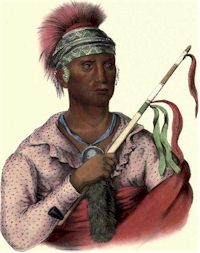
This is the fifth chief, in grade, in the Ioway tribe. In attempting to describe his own age, he said that he was born when his tribe made war, the first time, upon the Osages, and that, he believed, was about forty years ago. This is as near as the Indians usually approach to accuracy in regard to their own ages. He describes himself as having had a pacific disposition in childhood, and as having no desire to kill any thing until he was ten years old. At that time a great flight of wild pigeons covered the country, and he went out with other boys to kill them. Having been employed for some days in this way, he became fond of the sport, and then killed a squirrel. After that his brothers offered him a gun, of which at first he was afraid, but, being induced to receive it, he went out and shot a turkey. He remembers that, while yet a boy, being one day in the village, some warriors returned from an expedition, shouting, and making a great noise. The people collected around them, while the warriors sung and danced, and exhibited the scalps they had taken. His father took him by the hand, and said to him, “Son, listen to me. Look at those scalps, and at those great warriors! This is what I like to see. Observe those braves, and learn to follow their example-. Go to war and kill too, and the chiefs will look upon you as a brave man.” Such teaching would not be lost upon a boy, and least of all upon the Indian lad, whose first lesson inculcates the shedding of blood, and whose innate destructiveness, practiced in the beginning upon the lesser animals, is rapidly developed and improved as his strength increases, by the strongest incentives, until it attains its maximum in the great exploit of manslaughter. He was soon after permitted to accompany a war-party, and, being too young to bear arms, was employed in carrying the cooking utensils and other burdens. It is thus that the Indian boys, like the pages and squires of chivalry, are trained for the business of war. He was in the rear, when an onset was made upon a camp of the Kansas, and, running eagerly forward to indulge his curiosity, witnessed the killing of a woman, struck his knife into the expiring victim, and had the fortune to seize upon two children, who became his prisoners, and were afterwards given up by him to General Clark, the superintendent of Indian affairs, at St. Louis.
When about seventeen, he was at a hunting lodge with a small party, under his uncle, the Hard Heart, who left them, for a short time, to go to procure powder and lead. While lounging about the camp he espied an Omaha, who was peeping at him, and endeavoring at the same time to avoid observation. Neomonni called the stranger to him, and invited him to spend the night at the lodge. The Omaha, who probably could not readily escape, came to them, and they watched him all night. His death was resolved upon, but as the Indian seldom acts except by stratagem, the tragedy was deferred until morning. At the dawn they began to move their camp. While on the march, one of the party shot the Omaha, and Neomonni, after he had fallen, discharged an arrow into his body and scalped him. An old man of the party, whose son had been killed by the Omaha, exclaimed, ” Now I’ll be captain !” by which he meant, that, having a cause for revenge against the Omaha, he had the best right to take the lead in the savage gratification of exulting over a fallen enemy.
As our readers would not probably be edified by a particular detail of the sanguinary deeds of this chief, we shall not pursue the minute recital with which he was good enough to favor us. How ever interesting such adventures might be to the spectators of a war-dance, or the grave members of a council, we fear they might not be equally pleasing to civilized ears, and shall, therefore, abridge a narrative which contains but a repetition of such deeds as those already repeated.
The cloud out of which the rain comes for such is the signification of the compound word Neomonni is a warrior of repute. In one of his adventures he accompanied the celebrated Otto chieftain, to the river Platte; and when shown the portrait of that warrior, in a former number of this work, he immediately recognized his old comrade. In summing up his various exploits, he claims to have taken three scalps of the Kansas, two of the Omaha, one of the Missouri, one of the Sioux, one of the Sauk, and two of the Osages. In the reputable business of horse-stealing he has been engaged thirteen times, and has taken forty horses. On four expeditions he has acted as captain; and he has presented sixty-seven horses and twenty rifles, on different occasions, to individuals or tribes other than his own. These acts of liberality are recounted with much complacency, because, while they show on the one hand a wealth gained by daring and successful stratagem, they evince on the other a generosity, public spirit, and zeal for the honor of the tribe, highly becoming the character of a great chief.
